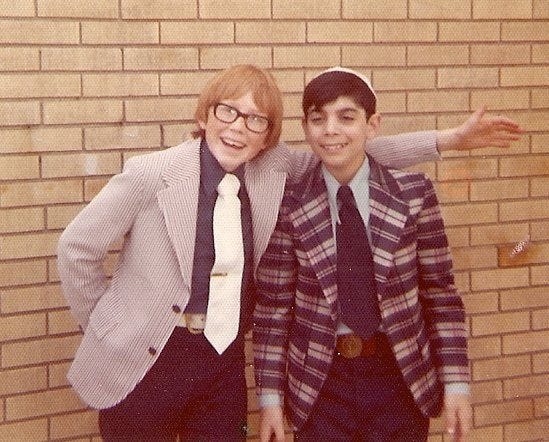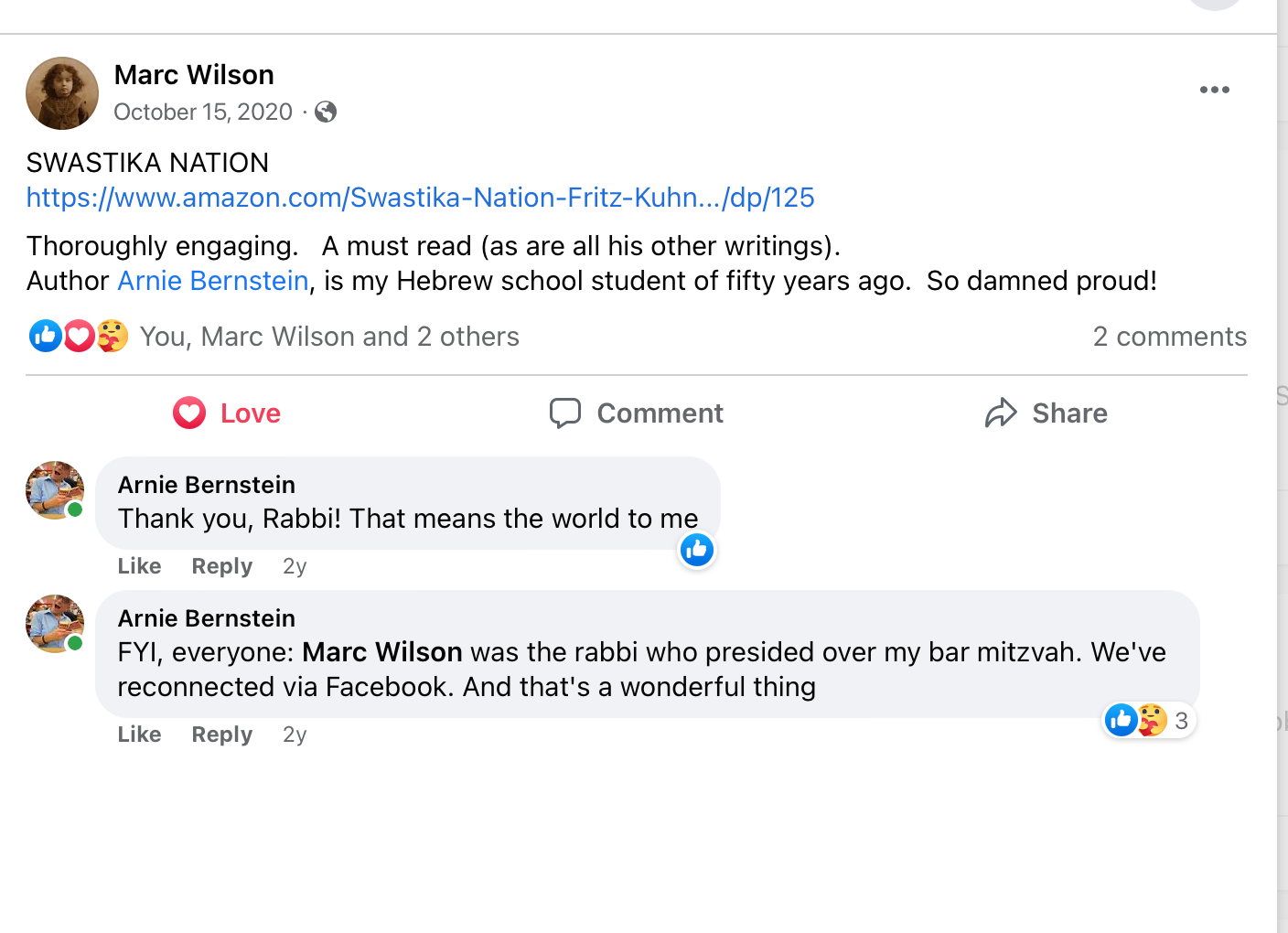The Wisdom of a Rabbi Remembered
Rabbi Marc Wilson prepared me for my bar mitzvah. His lessons never stopped.

There's an old joke. Two rabbis are talking shop. One says, “my synagogue is infested with mice. I’ve tried everything but I can’t get rid of them.” “Well,” says the second rabbi, “I used to have the same problem. But I found the perfect solution to keep the mice away from my shul.” “Really?” says the first rabbi. “What did you do?” “Easy,” says the second rabbi. “I bar mitzvahed all the mice and they quit going to temple.”
Classic, and like so many a good Jewish joke, it’s wrapped in truth. I was one of those mice. Once my bar mitzvah came and went, I lost all interest in going to synagogue. My Hebrew grew rusty to the point of nonexistence. None of the religious trappings of Judaism had any real appeal to me. (Spoiler alert: this changed and morphed over the years. Today I attend a Reform temple.)
Despite my falling away from the faith, the rabbi who officiated at my bar mitzvah remained strong in memory. Rabbi Marc Wilson had about as an un-Jewish name as mine was overwhelming Jewish. So what? Everyone at Adas Shalom, Rabbi Wilson’s shul in Morton Grove (a north suburb of Chicago) dug the guy. He was young, hip, and devoted to his congregation. And he genuinely liked us kids at the Hebrew school, always pushing us to be our best. Once, when in the middle of his lesson I blurted out that I felt sick. Rabbi Wilson rushed me into his office. I fell down and puked all over his office floor. Any other rabbi might have been mortified that the sanctity of his private quarters was desecrated in such a base manner. Not Rabbi Wilson. My well-being was the most important thing in his life at that moment. Better I should be taken care of then worry about the unpleasant miasma rising from the linoleum.
Two Lessons
Rabbi Wilson wasn’t just young and hip: he had empathetic wisdom. One lesson in particular made a lifelong impact on me. We were holding a fundraiser at the Hebrew school, selling commemorative stamps to raise funds for Israel. The stamps came with a small catalog, pages filled with pictures of various prizes. This was added incentive. If you sold a certain number of stamps, you could choose one of these tchotchkes as your reward for a job well done.
Rabbi Wilson took a dim view of this. The Jewish state was undergoing tough times. In May 1972 terrorists opened fire at the Lod Airport in Tel Aviv, killing 25 people and injuring another 80. That fall, at the Munich Olympics, the Palestinian terrorist group Black September murdered five Israeli athletes and six coaches. Israelis and Jews around the world were wracked with unbearable pain. Those were the biggest terrorist attacks that year, but there were plenty of others. Israel was in bad shape. Selling those stamps was our small way of providing support to a country in need.
So, Rabbi Wilson said to us, getting those premiums might be nice. But did we really need them? Why not sell these stamps and raise money simply because it was the right thing to do? That was gift enough. The money that went into these tchotchkes took away money better spent on the charity itself. Giving to those in need should be all the incentive we needed.
This wasn’t an admonition. It was a challenge to our moral sensibilities. I was a typical early adolescent, all id and hormones, thinking mostly about me, me, me. Rabbi Wilson’s observation kicked me out of that self-centered bubble. He was right. I didn’t need a silly trinket that would ultimately be consigned to the trash. Rabbi Wilson’s principled suggestion made an impact that’s lasted a lifetime. To this day I don't like giving to charity for any reason other than for charity’s sake. A simple "thank you" is reward enough, rather than the promise of another t-shirt I’ll never wear. That’s Rabbi Wilson’s influence, solid in my core values.
As I say, he was the officiant at my bar mitzvah. I don't remember a whole lot about it. I read my Torah and haftarah portions in Hebrew, Leviticus 19:1-20:27 and Isaiah 66:1-13, 23 respectively. (I won’t go into detail but with the former think of Cecil B. DeMille’s The Ten Commandments as Charlton Heston receives the eponymous tablets; the latter proves that God has a sense of humor: “So says the Lord, ‘The heavens are My throne, and the earth is My footstool.’” That’s a good cosmic joke.) I wore plaid polyester sportscoat, a clip-on tie, and shoes with oversized heels that gave me the illusion of height. I didn’t give any speech, that typical “today I am a man” stuff many bar mitzvah boys recite. It’s just as well. At 13 I had nothing profound to say, other than perhaps how the White Sox played the night before and what my hero Dick Allen did at the plate.
The temple itself, Adas Shalom, was small space, remodeled from a former shoe store into a modest synagogue. Given its size, the place could get crowded quick. On my bar mitzvah morning, it was crammed with family and friends. At the end of the service Rabbi Wilson looked at me, then at the packed house. His face was beaming. “You know you have a pennant winning team when it’s a standing room only crowd," he said. I fell in love with the line right on the spot. I’ve since used it many times under many circumstances, always crediting its author and source

As I said, after my bar mitzvah I drifted away from official Jewish life. Adas Shalom eventually folded, with the building razed and turned into a parking lot. At some point I heard Rabbi Wilson had moved to Atlanta, where he was doing some kind of community organizing. And that was it as far as our post-bar mitzvah connection.
Decades later, he slowly came back into my life.
The Jewish Santa
My next encounter with Rabbi Wilson came as a total surprise. The Reader’s Digest featured a story about a rabbi who played Santa Claus for children in need. Why would a leader in the Jewish community take on the role of this beloved Christmas icon, right down to beard and red hat? Granted, Santa is a mythical figure (and I’m sorry if I just destroyed anyone's belief in Santa Claus!). His answer was pure Rabbi Wilson. Playing Santa Claus for disadvantaged children did them a world of good. What’s more, basking in the joy of these kids was therapeutic in working through his bouts of severe depression.
Depression? Rabbis weren't supposed to have depression. They were figureheads, someone who had an ear to God that we civilians didn't. This was the beginning of a new lesson from Rabbi Wilson. I soon stumbled across another article he wrote, about his struggles with mental illness. Rabbi Wilson was speaking to me in a new way. He wasn't just the cool rabbi who made me rethink charity or used great baseball metaphors. Rabbi Wilson was a fellow traveler. We both were bona fide members of That Stupid Club No One Wants To Belong To But Is There Through No Fault Of Their Own. I’m talking about clinical depression.
I’ve lived with depression all my life. Some of you reading this may also be part of That Stupid Club. Many of my fellow club members remain silent about their internal suffering. I can’t say I blame them. Being open about your depression puts you in a vulnerable space. Given the multitude of misconceptions about this disease, it can be weaponized against you in ways large and small. Trust me, I know that all too well.
You could say it was brave of Rabbi Wilson to talk about this in such a public way, revealing his personal pain to a congregation of thousands. But that wasn’t the case. I knew what he was doing. Rabbi Wilson didn’t want anyone’s pity. It was a heartfelt lesson from a rabbi who taught us that giving to others is its own reward. He was using himself as an example to educate about a misunderstood illness, and to inspire members of That Stupid Club No One Wants To Belong To But Is There Through No Fault Of Their Own. From a distance, without knowing it, Rabbi Wilson was giving me new guidance.
And then, connection
A few years ago I got a message on Facebook (where else?) from Rabbi Wilson. It turns out that we were part of the same Facebook group “A Place for Liberal Jews.” It’s a social media hangout where us lefty MOTTs talk and debate issues. It can spirited forum, exemplifying the old adage “two Jews, three opinions.” After seeing a comment I made in the group, Rabbi Wilson immediately recognized my name. Now living in Greenville, South Carolina, he reached out to me, a former student from his old Chicago stomping grounds. I was floored that he remembered me.
As cherished as my memories were of Rabbi Wilson, it was humbling to know that I held a similar place in his own life. We wrote back and forth periodically. And then Rabbi Wilson related something that impressed me all the more.
A Tale of Hoffmans
I’m a history geek with a lot of different passions. Given my leftist leanings, I’m fascinated by the 1968 Democratic Convention in Chicago. It resonates on a lot of levels: political, social, cultural. The faceoff between Mayor Daley, his cops, and the antiwar protestors, followed by the subsequent Chicago Seven conspiracy trial is the stuff of both high drama and utter farce. Often those narrative dichotomies converged. When I was a grad student in the Columbia College-Chicago fiction writing program, I studied under John Schultz, who wrote the definitive accounts of the riots and the trial: The Democratic National Convention, August 1968 and The Conspiracy Trial of the Chicago Seven (AKA: Motion Will Be Denied; a New Report on the Chicago Conspiracy Trial). I highly recommend these books. John covered both of these happenings for The Evergreen Review, expanding his reportage into these two essential volumes. There’s an immediacy within John’s writing that puts you right alongside him as an eyewitness to unprecedented actions.
There’s no small irony that the old school stoic magistrate overseeing the Chicago Seven trial and one of the public prankster Yippie defendants shared a hearty Jewish surname: Judge Julius J. Hoffman and Abbie Hoffman. The two Hoffmans were opponents in a legal cage match, one laced with undertones of what it meant to be Jewish in America. In this corner was Judge Hoffman, the assimilated “Good Jew.” In that corner was the gleefully disobedient “Bad Jewish Boy” Abbie Hoffman, openly defying the immigrant’s code of “don’t act so Jewish in public.”
The Hoffmans knew how to push each other’s buttons. Each man stretched accepted courtroom protocols to their outermost limits. Finally, during a particularly tense moment in the proceedings, the Bad Boy Jew belted out a Yiddish phrase he knew would rile The Good Assimilated Jew like nothing else in the world. “Shanda fur der goyim!” Abbie shouted. The literal translation is “a shame before the nations.” It’s a powerful insult, with one Jew calling out another for denying their faith and ethnicity in order to appease non-Jews. Abbie Hoffman knew this verbal below the belt left hook would a real gut punch. He was right. Judge Hoffman exploded with anger, rendering the courtroom into complete chaos.
When Aaron Sorkin’s film The Trial of the Chicago Seven came out in 2020, I posted my critique on Facebook (again, where else?). I liked the film a lot but was disappointed that it left out this brawl of Jewish psyches. Here I hand it over to Rabbi Wilson and his response to me:
I always knew Rabbi Wilson was cool, but I never knew that he was the catalyst for that charged-up flashpoint in a legal circus overflowing with charged-up flashpoints. My admiration for Rabbi Wilson reached a whole new level.
And then—sadness. Rabbi Wilson went public with a new personal struggle. He had been diagnosed with multiple sclerosis. The disease was breaking him down, bit by agonizing bit. Ever the teacher, he shared his journey via Facebook and blog writings. Though Rabbi Wilson’s body was fading his mind remained sharp. Again I reached out to him, sending him a copy of my book Swastika Nation: Fritz Kuhn and the Rise and Fall of the German-American Bund. (If you’re not familiar with it, the log line is “1930s American Nazis and the people who beat them up.”) Rabbi Wilson’s response is the best review I ever got.
Finally, Rabbi Wilson made plain it on his Facebook page that his body was shutting down faster than he wanted. He could no longer post. I checked his page periodically to see how he was doing. There was nothing. Months went by. Life, as always, gets in the way of keeping up with things. A few days ago I bypassed Facebook, instead doing a Google search to see if there was anything out there about Rabbi Wilson, perhaps from his family or synagogue. Yes there was. It was his obituary. Rabbi Marc Wilson passed away on February 8, 2023, six months ago today as I post this.
Just as in my non-existent bar mitzvah speech, I don’t know if I can say anything profound about the far-reaching teacher/student relationship between Rabbi Wilson and me. I don't have his infinite rabbinical wisdom. What I do know is that Rabbi Wilson touched so many lives in countless ways. He made the world a better place. The family, friends, and admirers of Rabbi Marc Wilson could fill the sanctuaries of a thousand shuls.
To that end, I quote what Rabbi Wilson said at my bar mitzvah on May 5, 1973.
“You know you have a pennant winning team when it’s a standing room only crowd."

Links:
Rabbi Wilson’s wisdom live on through his writings. Check them out at The Times of Israel and Chabad Dot Org.
In addition to John Schultz’s books, you’ll find a wealth of information about the 1968 Chicago Democratic Convention riots and Chicago Seven trial on the Chicago History Museum website.
If you or someone you love is fighting depression or other mental illnesses, there is help. Remember, you are not alone. There’s a whole of of us in That Stupid Club No One Wants To Belong To But Is There Through No Fault Of Their Own. Here is a comprehensive look at the disease, including resources for more information.
What are your memories of those important people in your life? Share your thoughts in the comment section and on my Twitter X @realarnieb.











A beautiful tribute.
A Rabbi Wilson! I like that he challenged your moral sensibilities. How many others "snapped out of it" with you?